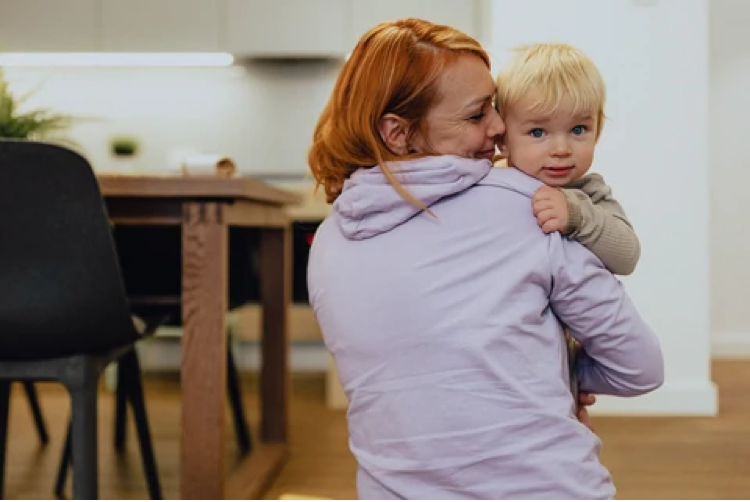
“Η προσέγγιση της Emmi Pikler”
“Η προσέγγιση της Emmi Pikler”
“The Emmi Pikler approach: Compact Ultimate Guide”
Our Mopitri is the modifiable climbing triangle that was designed for children to climb on and develop their gross motor skills in various ways.
That is a recognized tool for developing critical self-confidence skills amongst creativity, self-exploration and strengthening the body of a young child. These are also the main skills that Emmi Pikler wanted to establish for all children around the world. Her core principles relied on an uninterrupted play, respect towards children, and naturally paced development.
We understood that not so many people have a clear understanding of the principles and dr. Emmi Pikler’s approach and decided that they should be spread more widely and should be easily accessible. While it’s possible to find scattered information about this topic, there’s a need for a comprehensive, full and free article that answers most if not all questions about the Pikler approach and describes how these principles can be applied in day-to-day life at home or for any caregiver of a child.
You’ll learn about the background of Emmi Pikler and how her main childcare principles help children strive to their natural potential.
For your convenience, please use this content list:
Who was Emmi Pikler?
Why is the Pikler approach important in early childhood?
What is a natural development?
7 core principles of Dr. Emmi Pikler:
Full attention
Slow down
Build trust and your relationship during caregiving moments
“With” and not “to”
Babies are never put into a position they cannot get into by themselves
Allow babies uninterrupted time for play
Babies send us cues all the time, tune in respectfully
Dr. Pikler’s advice to new parents
Who was Emmi Pikler?
Dr. Emmi Pikler (1902-1984) was a pediatrician and infant educator who developed a new way of thinking about early childhood and childcare. She implemented her new approach at the orphanage she ran in Budapest and became famous worldwide for her respectful way of education.
Born in Vienna, Austria and at the age of 6 moved to Budapest, Hungary with her parents, as her mother was a Viennese kindergarten teacher and her father was a Hungarian craftsman. At the age of 25 in 1927, Emmi Pikler received her medical degree at Vienna University Children’s Hospital. In 1935 she became a qualified pediatrician back in Hungary and started writing books and giving lectures about early childhood care.
During World War II her husband György Pikler was imprisoned for 9 years, as her family was Jewish and they survived the persecution only with the help of parents that Emmi Pikler cared for. In 1946 she opened the famous Lóczy orphanage for infants who lost their parents during World War II and carried her philosophy on child care to children that were destined to suffer from the downside of the system. At Lóczy, nothing was done “to” a baby – it was done “with” the little one instead. In stark contrast to many orphanages at the time, the children living at the institution were not left in cots for long hours but allowed to play and explore freely. They weren’t rushed through care routines but the caregivers used those times to communicate and bond with the infants. Emmi Pikler believed that each child has the right to be respected and cared for in line with their own natural development.
The Pikler Institute was opened to make her philosophy into a researched study and provide training for other caregivers. This scientific approach led not only to a lot of children getting better care than the average citizen but also to many scientific publications, influencing many other childcare specialists that continued to spread and adopt her approach. Her most well-known apprentice was Magda Gerber who brought these ideas to her homeland USA, founded her own school of RIE (Resources for Infant Educarers) and we’ll include quotes from her in this article. Since then Dr. Pikler’s principles have been discovered to be in line with recent discoveries of neuroscience and attachment theory.
Emmi Pikler’s scientific and consultative work is continued also by her daughter, child psychologist Anna Tardos who now runs the Lóczy Institute.
Why is the Pikler approach important in early childhood?
Although the child’s development is intertwined with several important stalks, it is rooted in two main branches – brain and body development.
The brain development roots for the importance of the Pikler approach and other modern childcare philosophies are based on neuroscience. Thanks to many scientific discoveries in recent years, we now know that in the first 3 years of their life children develop neuron connections called synapses. Urban Child Institute says that by age 3 children have 2 times as many synapses as they will have in adult life. Adding to that their brain grows up to 80% of that they will have in adulthood. So all of the groundwork for the human brain is being done in early childhood. This includes language, communication patterns, behavioural systems, rules, oneself, and also physical coordination.
This means that all life experiences in this early childhood will be crucial looking forward – the child learns behaviours, self-respect, relationships. Dr. Emmi Pikler said that movement is the first language of the brain.
“Be careful what you teach. It might interfere with what they are learning.” – Magda Gerber

What is a natural development?
Natural development – a child learns at his own pace and by his own schedule. He is not to be rushed by our own expectations and comparisons to other children. Some children might be prone to standing up at 7 months old, and some after 12 months, and both are completely normal in their development. Some might try to skip walking and start by running. At the end of the day (or childhood) they will all come to the skills needed for their next step.
Benefits of the Pikler approach
Emmi Pikler created her principles to assure physical and psychic health in infants and young children. By observation, she conducted that the children she cared for were more calm, well developed physically, self-confident, and with great posture. Dr. Pikler’s approach is preaching natural motor development, self-directed play, trust, independence, and personality. So these main virtues that this approach establishes:
Physical health that will remain during the person’s whole life
Self-confidence and self-esteem
Well developed motor skills
Mastered practical life skills
Trust, peace between the baby and the caregiver
Respectful, profound relationships
As you can see there are several benefits also for the caregiver. You’ll be extremely connected to the child while observing his development, and you’ll build trust that way. This now small person will trust you later on in life. You will be proud of the natural spark a child has and how much he can actually achieve himself. And also you should be proud yourself because your work facilitated this incredible miracle that is natural human development.
“If we give children enough space and possibilities for free movement, they will move as beautifully and gracefully as animals: nimbly, simply, confidently and naturally” – Dr Emmi Pikler
7 core principles of Dr. Emmi Pikler’s approach
Dr. Pikler’s work is extensive and there’s a reason that Lóczy institute provides valuable on-site training to caregiving professionals about the method. And if you are interested in learning all the information and practicing the Pikler method, you can contact them or Pikler/Lóczy USA for the next training sessions. And below you can find a list of the core principles for the method of Emmi Pikler that can be used also by regular parents.
- Full Attention
As parents and caregivers, we need to be extra productive to manage our challenging lives and we are used to multi-task and doing several things at once. Yet children ask our full attention, our 100% and they ask it because they need it. With your full attention, you firstly show your respect and love. What your body language is saying to your baby is that she is important. Isn’t she? If your attention goes to your phone, to cleaning, to your friends then it must be important. But when you’re doing caring activities like feeding, changing diapers, touching, and observing it should be done with all of your focus.
This also brings stillness and sense back to our own chaotic and stressed lives when we divide our time not our attention.
If you have several children then each of them should receive your full attention at one time. When you’re done engaging with one, you can spend all of your time with the other one, and soon enough children will understand this system and count on when you are with them, they know that they experience your full attention.
- Slow Down
Do you perform better when you’re stressed and overwhelmed or calm and balanced? For most people, the second answer rings true, and the same is with infants and young children. As their brain is absorbing everything around them, including sounds, colors, shapes, shades, meaning, patterns and so much more, it’s not unusual for children to be overstimulated by our modern technological adult lives and become frustrated. Even when Dr. Emmi Pikler created her approach in the 1930s, one of the main observations was that babies develop better, are happier, and cry less when their environment is calm and their caregiver is peaceful, collected, and treats them respectfully especially during caring activities like washing and diaper change with respect to the child.
Nowadays we are led to believe that children need to be stimulated to help their development. Dr. Pikler is saying the opposite – avoid stimulating toys and let their development be slow and stable.
What to avoid:
Chaotic movements, rushing through activities while you’re engaged with the baby
Loud noises during the first 3-6 months, i.e. radio, parties, etc.
Bright colored toys with several trinkets around them that also make electric noises and moves by itself
TV and other screens. For as long as possible
These things and actions over-stimulate children and distract them from keeping focused on what they see important. When we keep our composition and move with confidence and ease, it impacts the child.
- Build Trust and your Relationship during Care Giving Moments
Emmi Pikler believed that parents and caregivers need to take time to make nappy changing, feeding, bathing, and dressing unhurried and pleasant. This is an addition to the previous point above. It should be quality one on one time with the baby being an active partner. Magda Gerber said “When you approach your baby with an attitude of respect, you let him know what you intend to do and give him a chance to respond. You assume he is competent and involve him in his care and let him, as much as possible, solve his own problems. You give him plenty of physical freedom and you don’t push development”. This communicates trust to the child – you trust him that he’s doing his best and he trusts you that you’ll do what’s in his best interest. Dr. Pikler observed that babies given security and freedom during caring activities will learn what they need to do and will become competent and cooperative partners. These moments of caregiving are sacred in building real relationships with a person.
“When you hold an infant, hold him not just with your body, but with your mind and heart.” – Magda Gerber
- ‘With’ and not ‘to’
Building a cooperative relationship with a baby requires that you work together on things. We tend to radically underestimate a baby’s willingness and capacity to act as active participants rather than passive recipients. This requires us to talk to our babies a lot more about what we would like to work with them on – being patient and allowing them time to respond.
Dr. Pikler viewed babies as active participants rather than passive recipients of care and encouraged caregivers to take a cooperative approach in all their interactions with babies. She said an important component in this is talking to babies every step of the way so they know what is about to happen and are given the option to help. Patience on the part of the carer is also required to ensure babies have the time to respond. This will take more time and each activity will be more energy-consuming at the beginning, but when this kind of reactive approach is being practiced daily, you will see that the baby is used being an active partner in your activities and will participate more and more.
- Babies are never put into a position which they cannot get into by themselves
When learning to lie on your stomach, rolling over, sitting down, standing and walking, your baby is not only learning the movements, but also the ability to learn how to do it. Baby learns to do something himself, learns to experiment, and learns to overcome difficulties. He learns to experience the joy and satisfaction of success that results from patience and perseverance. But if we, the parents, constantly put the children in a position that we think is comfortable, the child does not learn anything, he is tense and more harm than good is done.”
Yes, indeed, movement is restricted by many different toys found on store shelves – rocking chairs, walkers, car seats (used for home use). These things are more useful for the comfort and development of parents than for children. And as they are put in a position that they themselves couldn’t get into and can’t get out of they are essentially “trapped” and are no longer free in their movement.
Further to this, Dr. Pikler was opposed to baby equipment such as hammocks, swings, prams, and walkers, which she claimed were more about convenience for the carer rather than in the best interests of a baby’s development.
- Allow babies uninterrupted time for play
We don’t need to ‘entertain’ our babies because, given a nurturing environment and freedom to explore, babies are quite able of entertaining themselves. Not only that, our ‘help and support’ may actually interfere with what they are doing and thinking. As they are playing uninterrupted by our interaction, they are experiencing independence and mastery of their world. It is here that the early beginnings of self-esteem and confidence building is taking place.
Magda Gerber firmly believes that parents don’t need to entertain their babies because, given a nurturing environment and freedom to explore, babies are quite capable of entertaining themselves.
Not only that but what if our ‘help and support’ that we give (with love and good intentions), was actually interference with a sacred process? The unfolding of who they truly are meant to be.
As they play uninterrupted by our interaction, they are experiencing independence, and mastery of their world. It is here that the early beginnings of self-esteem and confidence building are taking place.
“Parents believe they treat their babies with respect. But if you watch well-meaning, loving adults, you’ll see that they will often interrupt baby’s play without a thought, and treat them in other ways that could hardly be called respectful.” – Magda Gerber
Dr. Pikler’s approach asserts that babies in a nurturing environment given space, time and the physical capacity to explore are fully capable of entertaining themselves. She said that offering babies uninterrupted opportunities to explore and learn about their world helped them develop confidence and self-esteem and that this process helps them learn who they are and develop a sense of being.
Let the child be the scriptwriter, the director and the actor in his own play.” — Magda Gerber
- Babies send us cues all the time, tune in respectfully
When we don’t “listen” to our babies the message we are sending them is “I know you have a message that you are communicating with me – but I’m ignoring it”. Since children eventually boomerang everything back to their parents that they have received from them – you can imagine where this may lead to a baby in four or fourteen years’ time.
When a baby turns her head away when you offer her another mouthful of veggies – she is saying quite clearly, “I’ve had enough”. Why then do perfectly sensible grown-ups offer another spoonful and say “Just one more for Mummy” or “Open the tunnel for the train – Here it comes!!!”
The message we are sending to our baby is “I know you have a message that you are communicating to me – but I’m ignoring it”. Since children eventually boomerang everything back to parents that they have received from them – you can imagine where this might lead a baby in four or fourteen years’ time!
Dr. Pikler said carers need to be more responsive and respectful of a child’s physical and verbal cues to ensure the development of a culture of mutual respect. She said that when carers ignore the explicit messages given to us by children it increases the likelihood they will ignore the messages and requests made to them by carers in later life.
“The relationship is all. It is a matter of life to the baby.” – Dr Emmi Pikler.
Dr. Pikler’s Advice for new parents:
In her research on gross motor development and pediatric practice, Dr. Emmi Pikler noticed that healthy babies have inner developmental know-how. Trust this knowledge. Give your baby space and time, on the floor (on a blanket) to move as he or she needs to move, explore as he or she wants. Realize that he/she will turn over, sit up and walk when the time comes. They don’t need help to do this. In fact, putting the baby into a position that she can’t get into herself means putting her in a position her muscles and bones aren’t ready to support. Getting her used to this time alone on the floor, in a safe space, also gives you time to do your own thing. While she’s lying on her back, even at the youngest age, she can be fully absorbed in a ray of sunshine, passing shadows on the wall, people’s movement in and out of her field of vision, her own hands. You don’t need to entertain or “stimulate” your infant.
The thousands of times you will change, dress, bathe and feed your infant are perfect times to slow down, tune in, be with the baby fully, interact, tell them what you’re going to do before you do it, and involve her in the doing – even before she can understand your words. “Now I’m going to put on your pants. Can you lift your foot?”
Babies are people but we don’t always remember to treat them as such. If she is on the floor and needs a nappy change, stop for a moment, and observe. Is she busy with something? Can you wait a second? If you say, “I need to change your nappy now”, put out your arms, and give her a chance to respond, she will feel respected.
S



